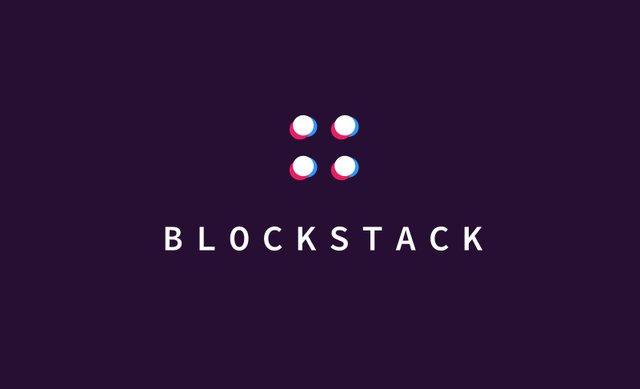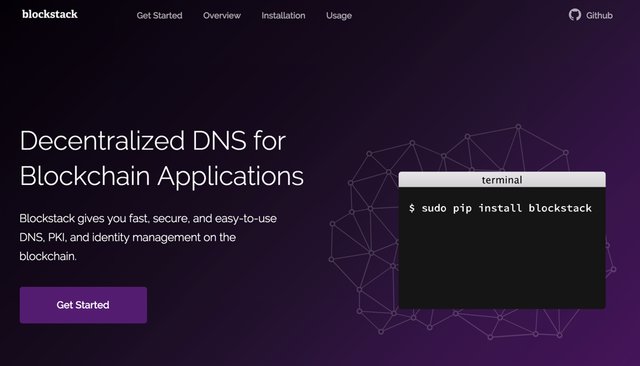What is Blockstack and Can it Improve Online Privacy?
With the decentralized nature of the internet starting to come up under increasing threats because of the dominance of mega corporations like Google, Amazon, and Facebook, many proponents of a free and decentralized internet accept started their ain open source movements to build the side by side-generation engineering science that can power the open internet. One such engineering that has received quite a bit of success over the by few years is Blockchain; a secure, distributed, peer-to-peer platform that powers the world'south leading cryptocurrency, Bitcoin. Based on the same platform, a new technology called Blockstack may well revolutionize the internet every bit we know information technology today past putting the power dorsum into the hands of terminate-users past giving them complete command over their personal data. And then in case the idea of being in charge of your own data sounds intriguing to you, hither'southward what you need to know most Blockstack and how it may ameliorate online privacy:
What is Blockstack?
Dubbed 'Web 3.0' by some, Blockstack promises to upend the condition quo of the electric current internet by creating an all-new, decentralized internet that allows users to control their own data by storing them locally on their ain devices rather than allowing mega corporations to shop them in their own servers and employ them equally they deem fit. Built on the Bitcoin blockchain, Blockstack is a key/value pair registration and transfer arrangement that represents a dramatic difference from the way the internet functions today, and if successful, would effectively end the whole business of tracking and identifying users across the world wide web.
 The applications that run on Blockstack are decentralized and server-less. The system eliminates middlemen similar Google, Facebook, or WhatsApp, assuasive users to directly transfer information between themselves, thereby putting them in control over their ain personal information. The digital ledger, or blockchain, that's used to go along rails of all the information is a peer-to-peer network that'south distributed among millions of computers around the globe, which means no one entity has control over any personally identifiable data. The new applied science hopes to change the mode the internet functions today by replacing current services like DNS, PKI (public key infrastructure) and cloud storage, thereby putting users in charge of their own information and online traffic.
The applications that run on Blockstack are decentralized and server-less. The system eliminates middlemen similar Google, Facebook, or WhatsApp, assuasive users to directly transfer information between themselves, thereby putting them in control over their ain personal information. The digital ledger, or blockchain, that's used to go along rails of all the information is a peer-to-peer network that'south distributed among millions of computers around the globe, which means no one entity has control over any personally identifiable data. The new applied science hopes to change the mode the internet functions today by replacing current services like DNS, PKI (public key infrastructure) and cloud storage, thereby putting users in charge of their own information and online traffic.
Just similar Linux, Blockstack is an open source project with a GPLv3 license for the core technology. Merely like nonprofit organizations and commercial entities can both build apps and services on pinnacle of Linux as long as they bide past the terms of the license, Blockstack, too, provides developers the opportunity to build decentralized apps (dApps) and services on tiptop of existing blockchain infrastructure in a mode that would put users in charge of their own data.
Who Are The People Behind Blockstack?
Blockstack was founded in 2013 as Onename by ii figurer engineers from Princeton, Muneeb Ali and Ryan Shea. The organisation has raised around $5.45 million in venture capital letter from a number of firms including, Union Foursquare Ventures, Digital Currency Grouping, and AngelList co-founder Naval Ravikant. According to a mail on the official Blockstack blog, the project is currently maintained by Jude Nelson, Larry Salibra and Guy Lepage, alongside the 2 co-founders.
How Does Blockstack Hope to Ameliorate Online Privacy?
To understand how Blockstack can aid revolutionize the internet in terms of putting people in command of their own data, we need to offset understand how the technology works in the first place. Each Blockstack node contains its own ledger of domain names and the IP addresses that those domain names would eventually resolve to. According to a whitepaper released past Blockstack last May, Domain name transactions on the network include "registrations, transfers and data updates. These operations are encoded into the underlying blockchain through transactions and use the Remote Procedure Phone call (RPC) API in guild to practise its piece of work and update its ain database".
Blockstack seeks to implement a decentralized DNS system to resolve domain name queries. Equally briefly touched upon earlier, the entire platform is based upon the Bitcoin blockchain, which is used to annals and protect domain names with a decentralized ledger, making the whole system more secure than the traditional DNS organization. The technology also promises to provide protection from enshroud poisoning and resist censorship. Another major benefit of platforms like Blockchain or Ethereum are decentralized apps, or 'dApps', that ensure privacy and anonymity by running on a P2P network rather than on a single estimator.
What Are Decentralized Apps (dApps) and What dApps Can I Employ Today?
Decentralized apps, or dApps, are peer-to-peer software programs that are designed to operate autonomously. Different traditional applications like Facebook or Google that demand centralized servers to work, these types of software are designed to run independently, and are non controlled by any unmarried entity. While dApp technologies like Ethereum, MaidSafe, BURST, and others have made quite a lot of progress in contempo times, nigh dApps (and their underlying platforms) are yet in a nascent stage at this indicate in fourth dimension. That beingness said , many different dApps on a wide variety of platforms are currently already available or are in advanced stages of evolution. Some of the best ones available on the Blockstack platform are Casa, a decentralized alternative to Airbnb, and OpenBazaar, a decentralized culling to eBay.
How Does Blockstack DNS Differ From Namecoin DNS?
Blockstack isn't the only engineering science that's looking to free netizens from the grasp of mega corporations that are putting the decentralized nature of the internet under threat. Namecoin is mostly known for the eponymous cryptocurrency that was created as a result of the first major fork of Bitcoin, and is currently one of the preeminent 'alt-coins' you can purchase. Unlike its parent, however, Namecoin tin actually store data inside its own blockchain transaction database. And like Blockstack, it likewise professes to improve decentralization, security, censorship resistance, privacy and DNS lookup speeds. Nevertheless, the 2 technologies differ in a few fundamental ways.
 First off, Blockstack and Namecoin differ in how the DNS is operated. While Namecoin DNS is operated by Namecoin nodes, Blockstack DNS is designed to be able to read and write data to any blockchain, which means it won't be shackled to the underlying Bitcoin blockchain even though it is based on information technology in the first place.
First off, Blockstack and Namecoin differ in how the DNS is operated. While Namecoin DNS is operated by Namecoin nodes, Blockstack DNS is designed to be able to read and write data to any blockchain, which means it won't be shackled to the underlying Bitcoin blockchain even though it is based on information technology in the first place.
The storage model of Blockstack DNS also differs significantly from that of Namecoin DNS. According to Blockstack, it offers "a wide range of options for users to create their ain namespaces and set their own proper noun pricing schemes", while with Namespace, users don't get either of those options. This, according to Blockstack, "results in rampant squatting, which significantly degrades the user experience for anyone trying to register names".
Finally, Blockstack is working towards a system where registration fees for domain names will beginning going to miners, which would create "a significant economic incentive for them to contribute additional resources to the underlying blockchain". This would as well mark a significant departure from the way Namecoin DNS does it right now.
How Does Blockstack Differ From Ethereum?
First off, Ethereum is a blockchain in itself, while Blockstack is a "layer ii" technology that builds on superlative of an underlying blockchain. Co-ordinate to Blockstack co-founder, Muneeb Ali, Ethereum could be thought of equally a "heavy blockchain" that takes intendance of all the complexities, computations, scalability, and security bug. Blockstack, on the other mitt, "puts minimal logic into a blockchain and handles scalability outside of the blockchain by re-using existing internet infrastructure in new means". Unlike Ethereum, Blockstack is as well relatively well-insured against blockchain failures such as, 51% attacks, netsplits or hard-forks, because it is blockchain-agnostic, which means that the entire network can just migrate to some other blockchain in such scenarios.
Can nosotros Look Blockstack to E'er Get Mainstream?
While the concept of decentralized applications, or dApps, is really starting to gain momentum, it continues to remain a niche undertaking for the near part. Even co-founder Ryan Shae, in a Medium post just a few weeks ago, admitted that 2017 and 2018 users would be technologically advanced early adopters who are "more interested in having their data protected, and intrigued past the possibilities of decentralized apps". Yet, he also goes on to predict that next twelvemonth might also be the breakthough year for the bold new "re-decentralized" internet, when the first truthful dApp can actually hit the ane million user milestone. And then basically, dApps are nevertheless a long style away from hitting primetime, and whether or non they are the futurity of the net, the modify from status quo isn't likely to happen any time soon.
Meet ALSO: Tiptop 8 Bitcoin Alternative Cryptocurrencies You Tin Utilise
Can Blockstack Revolutionize The Net as we Know it Today?
While its lofty ambitions of revolutionizing the fashion internet works is nonetheless a long way away from becoming a reality, Blockstack is already well on its way of ensuring more privacy for regular netizens. Whether information technology will be successful in its endeavor remains to be seen, but for now, Blockstack and other such decentralized platforms have momentum on their way. Hopefully with a little bit of luck and increasing public awareness about the need for online privacy, nosotros will indeed take a truthful, decentralized internet sooner rather than later. In case yous're besides as intrigued and excited at the idea of a truly anonymous, decentralized internet as I am, do leave a comment below to let the states know how you lot await the technologies to pan out going frontwards.
Source: https://beebom.com/what-is-blockstack-how-promises-improve-online-privacy/
Posted by: kingbetimesely.blogspot.com


0 Response to "What is Blockstack and Can it Improve Online Privacy?"
Post a Comment